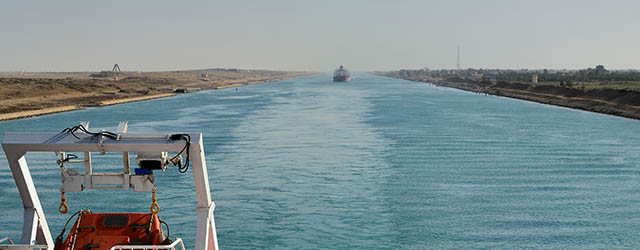At a lavish ceremony last month, the Egyptian government inaugurated the new Suez Canal, marking an expansion of the original project, which dates to 1869.

The new canal, designed to allow two-way traffic and reduce congestion, is set to boost Egypt’s faltering economy. According to the government, the number of ships passing through the canal will increase the daily average of transiting vessels from the current 49 ships to 97 by 2023, increasing revenues from $5.3 billion at present to $13.2 billion by 2023.
However, some analysts believe the economic windfall may not be as great as the Egyptian government is forecasting.
In fact, there is every reason to think the forecasts are overly optimistic. Historically, there has been a strong correlation between traffic passing through the canal and global trade volumes. But the government’s estimate appears predicated on a major pickup in global trade. To achieve the Egyptian government’s optimistic estimates, global trade volumes would need to increase by 9% year-on-year. That is in stark contrast to the 3% year-on-year achieved in the past three years, and the 7.5% in the boom years between 2003 and 2007. A more plausible scenario would be 5% year-on-year growth in the medium term, according to Capital Economics in London.
A doubling of the number of ships passing through the canal might increase receipts by the equivalent of 2.5% of 2014 GDP, according to the firm. Historically, the government’s take of Suez Canal revenues has been around 50%, suggesting the boost to fiscal revenues could be around 1.3% of GDP. Merely having more ships pass through the new canal should boost GDP, which could grow 0.3% to 0.4% faster, Capital Economics says.
Indirect benefits to Egypt’s economy include government plans to develop a major industrial hub close to the canal. That will drive employment and productivity, although the security situation in Egypt could put a brake on further investment and dent sentiment.
The upgraded Suez Canal will undoubtedly be positive for Egypt’s economy—but the government’s predictions should be taken with a grain of salt.



